Unit 2
unit 2 单词(完整)

1.容许,准许……进(加)入 a.Only one hundred boys are admitted to/into
the school every year.
每年学校准许100名男生入校。
b.He is admitted as a member of the basketball team.
他被接受成为篮球队的一名队员。
4. take part in 参加;参与
They often _____ take _____ part ____ in outdoor
activities.
他们经常参加室外活动。
take part in join in join
参加活动,并在其中起 积极作用 参加小规模的活动如 “球赛、游戏”等 加入某人或某个组织成 为其中一员 参加会议、婚礼、典礼; 听报告、讲座
英语 必修2 Book 2 Unit 2
词汇表
1. ancient ['eɪnʃ(ə)nt] adj. 古代的.古老的 2. compete [kəm'piːt]vi. 比赛;竞争
petitor [kəm'petɪtə]n. 竞争者
The cycle of learning vi. 比赛;竞赛 compete [kəmˈpi:t] competitive [kəmˈpetətɪv] adj.竞争的 n. 比赛,竞赛 competition [ˌkɒmpəˈtɪʃn]
stand by sb.
反对
支持某人
辞职
stand out stand against
stand down
袖手旁观,支持
显眼,突出
7. △ mascot ['mæ skɒt] n 吉祥物
Unit 2 课文翻译
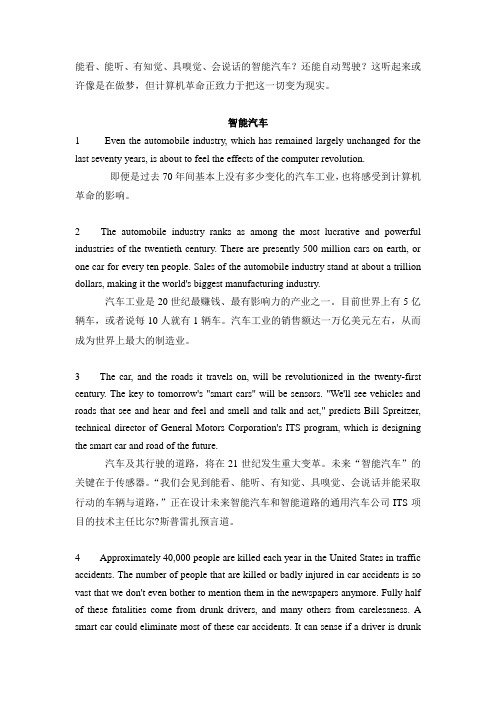
能看、能听、有知觉、具嗅觉、会说话的智能汽车?还能自动驾驶?这听起来或许像是在做梦,但计算机革命正致力于把这一切变为现实。
智能汽车1 Even the automobile industry, which has remained largely unchanged for the last seventy years, is about to feel the effects of the computer revolution.即便是过去70年间基本上没有多少变化的汽车工业,也将感受到计算机革命的影响。
2 The automobile industry ranks as among the most lucrative and powerful industries of the twentieth century. There are presently 500 million cars on earth, or one car for every ten people. Sales of the automobile industry stand at about a trillion dollars, making it the world's biggest manufacturing industry.汽车工业是20世纪最赚钱、最有影响力的产业之一。
目前世界上有5亿辆车,或者说每10人就有1辆车。
汽车工业的销售额达一万亿美元左右,从而成为世界上最大的制造业。
3 The car, and the roads it travels on, will be revolutionized in the twenty-first century. The key to tomorrow's "smart cars" will be sensors. "We'll see vehicles and roads that see and hear and feel and smell and talk and act," predicts Bill Spreitzer, technical director of General Motors Corporation's ITS program, which is designing the smart car and road of the future.汽车及其行驶的道路,将在21世纪发生重大变革。
unit 2(新探索研究生英语)

unit 2(新探索研究生英语)
《新探索研究生英语》是为非英语专业研究生开设的英语课程,旨在提高学生的英语应用能力和跨文化交际能力,培养具有国际视野和跨文化交际能力的高层次人才。
该课程包括听、说、读、写、译等方面的教学内容,注重培养学生的实际语言运用能力和跨文化交际能力。
通过课堂教学、研讨、实践活动等多种形式,鼓励学生积极参与、主动思考,提高其英语表达和交流能力。
此外,《新探索研究生英语》还注重培养学生的批判性思维和创新能力,鼓励学生独立思考、勇于探索,培养其创新意识和跨学科视野。
同时,该课程还注重培养学生的跨文化意识和跨文化交际能力,通过引入不同文化背景的素材和案例,帮助学生了解不同文化之间的差异和共性,提高其跨文化交际能力。
总之,《新探索研究生英语》是一门综合性、实用性和人文性相结合的英语课程,注重培养学生的英语应用能力和跨文化交际能力,有助于提高学生的综合素质和未来的职业发展。
(Unit 2)词汇巧记
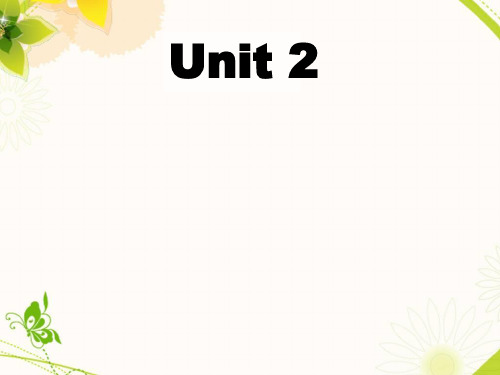
4. gas n. 汽油;气体;煤气;毒气 谐音:该死
记忆法:该死,煤气中毒了。
5. official adj.官方的;正式的;公务的 offic(英文office)办公室; i(英文)我; al(英文all)全部 记忆法:办公室已正式的规定,我是全部员工 的领导。
20. frequent adj.频繁的;常见的 fr(拼音)夫人;e(拼音)鹅;qu (拼音)去; e(拼音)鹅;nt(拼音)难题 记忆法:夫人虽然喜欢吃鹅,但频繁的去买鹅, 也是个难题。
21. usage n. 使用;用法;词语惯用法 us(英文)我们; age (英文)年龄 记忆法:我们对上了年龄的人使用敬语。
27. African adj. 非洲的;非洲人的 africa (英文)非洲;n(拼音)拿 记忆法:在非洲拿非洲人的东西是不好的。
(Unit 2)词汇巧记
28. eastern adj. 东方的;东部的 eas(英文easy)容易;te (拼音)特;rn(拼音)乳牛 记忆法:容易买到东方的特别乳牛。
记忆法:弟弟一乐就用传统方言说话。
25. expression n. 词语;表示;表达 ex(拼音)儿媳;press (英文)逼迫;i(英文)我; on(英文)在……上面 记忆法:儿媳逼迫我在上面做词语练习。 26. midwestern adj.中西部的;有中西部特性的 合成词: mid(英文)中间的; western (英文)西部的 记忆法:中间的加西部的,就是中西部的。
Unit 2
1. subway n. 地下人行道;<美>地铁 su (拼音)苏;b(拼音)伯;way(英文)路 记忆法:苏伯伯过马路走地下人行道。
unit 2知识点
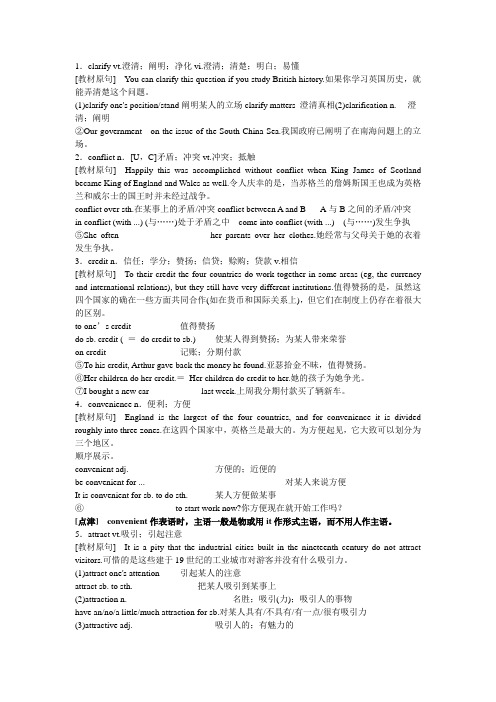
1.clarify vt.澄清;阐明;净化vi.澄清;清楚;明白;易懂[教材原句]You can clarify this question if you study British history.如果你学习英国历史,就能弄清楚这个问题。
(1)clarify one's position/stand阐明某人的立场clarify matters 澄清真相(2)clarification n. 澄清;阐明②Our government on the issue of the South China Sea.我国政府已阐明了在南海问题上的立场。
2.conflict n.[U,C]矛盾;冲突vt.冲突;抵触[教材原句]Happily this was accomplished without conflict when King James of Scotland became King of England and Wales as well.令人庆幸的是,当苏格兰的詹姆斯国王也成为英格兰和威尔士的国王时并未经过战争。
conflict over sth.在某事上的矛盾/冲突conflict between A and B A与B之间的矛盾/冲突in conflict (with ...) (与……)处于矛盾之中come into conflict (with ...) (与……)发生争执⑤She often her parents over her clothes.她经常与父母关于她的衣着发生争执。
3.credit n.信任;学分;赞扬;信贷;赊购;贷款v.相信[教材原句]To their credit the four countries do work together in some areas (eg, the currency and international relations), but they still have very different institutions.值得赞扬的是,虽然这四个国家的确在一些方面共同合作(如在货币和国际关系上),但它们在制度上仍存在着很大的区别。
大学英语教材unit2
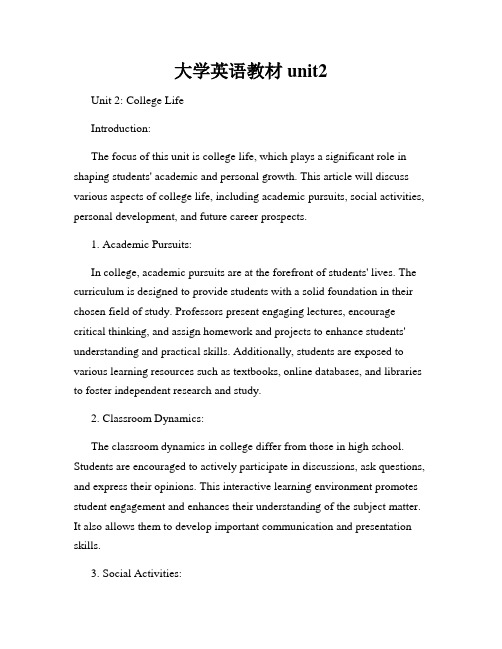
大学英语教材unit2Unit 2: College LifeIntroduction:The focus of this unit is college life, which plays a significant role in shaping students' academic and personal growth. This article will discuss various aspects of college life, including academic pursuits, social activities, personal development, and future career prospects.1. Academic Pursuits:In college, academic pursuits are at the forefront of students' lives. The curriculum is designed to provide students with a solid foundation in their chosen field of study. Professors present engaging lectures, encourage critical thinking, and assign homework and projects to enhance students' understanding and practical skills. Additionally, students are exposed to various learning resources such as textbooks, online databases, and libraries to foster independent research and study.2. Classroom Dynamics:The classroom dynamics in college differ from those in high school. Students are encouraged to actively participate in discussions, ask questions, and express their opinions. This interactive learning environment promotes student engagement and enhances their understanding of the subject matter. It also allows them to develop important communication and presentation skills.3. Social Activities:Apart from their academic commitments, college students engage in various social activities. These activities create opportunities for students to form friendships, develop social networks, and experience personal growth. Student clubs, cultural events, sports teams, and volunteer activities are popular choices for students to actively participate in their college community.4. Personal Development:College life offers a platform for personal growth and self-discovery. Students gain valuable life skills such as time management, organization, and responsibility as they juggle academics, extracurricular activities, and personal commitments. Living away from home and being independent also fosters self-reliance and decision-making abilities.5. Future Career Prospects:One of the primary goals of college education is to prepare students for their future careers. In addition to academic knowledge, college life offers various opportunities for students to develop professional skills. Internships, career fairs, and networking events provide avenues for students to gain practical experience and establish professional connections. Colleges also offer career counseling and guidance to help students explore different career paths and make informed decisions.Conclusion:College life is a transformative period that shapes students academically, socially, and personally. Through academic pursuits, engagement in social activities, personal growth, and future career prospects, students acquire thenecessary skills and experiences to succeed in their chosen fields. The holistic development offered by college life not only prepares students for their professional lives but also helps them become well-rounded individuals.。
必修二unit2单词表
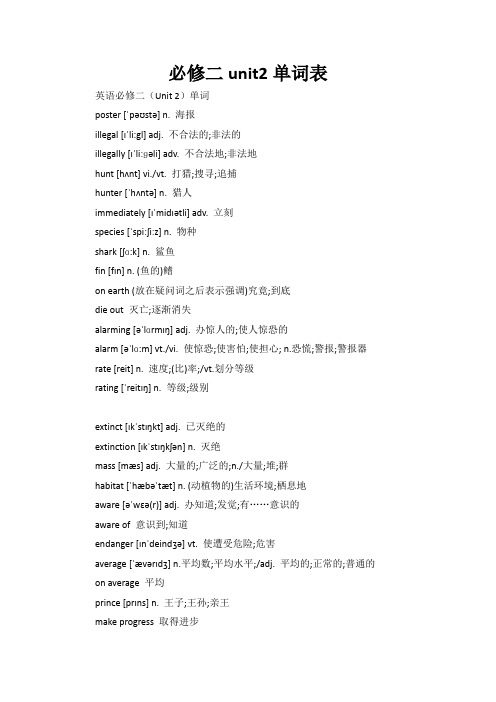
必修二unit2单词表英语必修二(Unit 2)单词poster [ˈpəʊstə] n. 海报illegal [ɪˈli:gl] adj. 不合法的;非法的illegally [ɪˈliːɡəli] adv. 不合法地;非法地hunt [hʌnt] vi./vt. 打猎;捜寻;追捕hunter [ˈhʌntə] n. 猎人immediately [ɪˈmidɪətli] adv. 立刻species [ˈspiːʃiːz] n. 物种shark [ʃɑ:k] n. 鲨鱼fin [fɪn] n. (鱼的)鳍on earth (放在疑问词之后表示强调)究竟;到底die out 灭亡;逐渐消失alarming [əˈlɑrmɪŋ] adj. 办惊人的;使人惊恐的alarm [əˈlɑ:m] vt./vi. 使惊恐;使害怕;使担心; n.恐慌;警报;警报器rate [reit] n. 速度;(比)率;/vt.划分等级rating [ˈreitɪŋ] n. 等级;级别extinct [ɪkˈstɪŋkt] adj. 已灭绝的extinction [ɪkˈstɪŋkʃən] n. 灭绝mass [mæs] adj. 大量的;广泛的;n./大量;堆;群habitat [ˈhæbəˈtæt] n. (动植物的)生活环境;栖息地aware [əˈwɛə(r)] adj. 办知道;发觉;有……意识的aware of 意识到;知道endanger [ɪnˈdeindʒə] vt. 使遭受危险;危害average [ˈævərɪdʒ] n.平均数;平均水平;/adj. 平均的;正常的;普通的on average 平均prince [prɪns] n. 王子;王孙;亲王make progress 取得进步concern [kənˈsɜːn] vt. 涉及;让……担忧concerned [kənˈsɜːnd] adj. 担心的;关切的concerned about 对……关切的;为……担忧的living [ˈlɪvɪŋ] adj. 居住的;活的;在用的;n./生活;生计adapt [əˈdæpt] vi.适应;/vt. 使适应;使适合adapt to 适应measure [ˈmɛʒə] n.措施;方法;/vt. 测量;度量;估量authority [ɔːˈθɒrəti] n. 官方;权威;当权pressure [ˈprɛʃə] n. 压力;要求under pressure 在承受压力whale [wel] n. 鲸antelope [ˈæntɪləʊp] n. 羚;羚类动物Tibetan antelope 藏羚羊reserve [rɪˈzɜːv] n.保护区;储藏(量);/vt. 预订;预留;保留plain [plein] n.平原; /adj. 简单明了的;直率的;平凡的make out 看清;听清;分清herd n.牧群;兽群observe [əbˈzɜːv] n. 观察(到);注视;遵守beauty [ˈbju:ti] n. 美;美人;美好的东西remind [rɪˈmaɪnd] vt. 提醒;使想起remind sb of sb/sth 使某人想起(类似的人或物)fur [fɜː] n. 毛(皮); 毛皮衣服herb [hɜːb] n. 兽群sacred [ˈsekrɪd] adj. s神圣的;受尊敬的shoot [ʃut] vt./vi. (shot,shot) 杀;射伤;发射profit [ˈprɑfɪt] n. 利润;利益watch ove 保护;照管;监督day and night 日日夜夜;夜以继日attack [əˈtæk] n./vi./vt. 攻击;抨击effective [ɪˈfɛktɪv] adj. 有效的;生效的recover [rɪˈkʌvə] vt. 恢复;康复;找回;寻回remove [rɪˈmuv] vt. 去除;移开;脱去intend [ɪnˈtɛnd] vi./vt. 打算;计划;想要threat [θrɛt] n. 威胁threaten [ˈθrɛtn] vt. 威胁;危及exist [ɪɡˈzɪst] vi. 存在;生存harmony [ˈhɑrməni] n.和谐;融洽goods [ɡʊdz] n. 商品;货物creature [ˈkritʃə] n. 生物;动物deer [dɪr] n. 鹿kangaroo [ˌkæŋɡəˈru:] n. 袋鼠reduce [rɪˈdjʊs] vt. 减少due [dju] adj. 由于;因为due to 由于;因为insect [ˈɪnsɛkt] n.昆虫net [nɛt] n.网(=Internet);/adj. 净得的;纯的neighbourhood [ˈneɪbərhʊd] n. 临近的地方;街区binoculars [bɪˈnɑkjəlɚz] n.b双筒望远镜bird field guide 鸟类图鉴search for 捜索;查找dolphin [ˈdɒlfɪn] n. 海豚Yangtze River dolphin 白鳍豚koala [kəʊˈɑ:lə] n. 树袋熊;考拉stir [stɜː] vt. 激发;搅动stir up 激起emotion [ɪˈməʊʃən] n. 感情;情感;情绪skin [skɪn] n. 皮;皮肤unusual [ʌnˈjʊʒʊəl] adj. 特别的;不寻常的Tibetan /tɪ’betn/ adj 西藏的; 藏语的; 藏族(人)的n.西藏人; 藏族人; 藏语Tibet /tɪ’bet/ n.西藏。
Unit 2 课文中英文
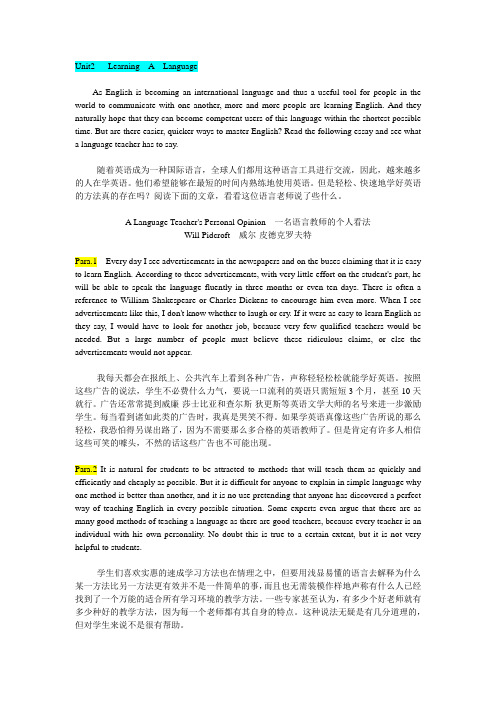
Unit2 Learning A LanguageAs English is becoming an international language and thus a useful tool for people in the world to communicate with one another, more and more people are learning English. And they naturally hope that they can become competent users of this language within the shortest possible time. But are there easier, quicker ways to master English? Read the following essay and see what a language teacher has to say.随着英语成为一种国际语言,全球人们都用这种语言工具进行交流,因此,越来越多的人在学英语。
他们希望能够在最短的时间内熟练地使用英语。
但是轻松、快速地学好英语的方法真的存在吗?阅读下面的文章,看看这位语言老师说了些什么。
A Language Teacher's Personal Opinion 一名语言教师的个人看法Will Pidcroft 威尔·皮德克罗夫特Para.1 Every day I see advertisements in the newspapers and on the buses claiming that it is easy to learn English. According to these advertisements, with very little effort on the student's part, he will be able to speak the language fluently in three months or even ten days. There is often a reference to William Shakespeare or Charles Dickens to encourage him even more. When I see advertisements like this, I don't know whether to laugh or cry. If it were as easy to learn English as they say, I would have to look for another job, because very few qualified teachers would be needed. But a large number of people must believe these ridiculous claims, or else the advertisements would not appear.我每天都会在报纸上、公共汽车上看到各种广告,声称轻轻松松就能学好英语。
- 1、下载文档前请自行甄别文档内容的完整性,平台不提供额外的编辑、内容补充、找答案等附加服务。
- 2、"仅部分预览"的文档,不可在线预览部分如存在完整性等问题,可反馈申请退款(可完整预览的文档不适用该条件!)。
- 3、如文档侵犯您的权益,请联系客服反馈,我们会尽快为您处理(人工客服工作时间:9:00-18:30)。
Unit 2Part OneExercise 2 1. F 2. F 3.T 4. F 5. T 6 TExercise 31. donations/ individuals and organizations2. dedicate/ time and resources3. loving and caring4. keep coming5. keep the best6. feel better about7. not necessarily8. lovely surprise9. truth/ understanding 10. real keyPart TwoListening IExercise 11. department store2. attend college3. difficult4.physical education5. terrifiedExercise 21. F2. T3. T4.F5. TListening IIExercise 11.80/ eighty2. Caps, sweaters and scarves3. Her daughter-in-law4. Because she is blind5. 19/ nineteen6. In China7. 1/ One8. TorontoExercise 21. 60/ sixty2. making up3. various parts of the world4. a printed slip of5.Never before6. a personal letter7. who is wearing the clothingPart Three More ListeningPractice OneExercise 1 1.C 2. A 3. D 4. C 5. BExercise 21. approaching2. left3. toilet4. locked5.Tickets6. please7. pushed8. stampedPractice TwoExercise 1 1. C 2. A 3. DExercise 2 2. 4. 5.6.8.9Practice ThreeExercise 1 Written language 2. 3. 5.6Spoken language 1. 4Exercise 21. spoken language2. sign language3.representations4. derived fromPractice FourExercise 11. misunderstanding 2 . lump 3. 5/ five 4. cancer 5. fineExercise 21. T2. F3. T4. T5.T6.FPart Four Testing YourselfSection 11. A 2 . D 3. A 4. B 5. CSection II1. moods2. regularly3. meet4. risks5.hurt6. satisfy7. disappointed8. should9.unless 10. stuckSection III1. F2. T3. F4. F5.T6.FScriptsPart TwoListening 1My name is Atsuko Saeki. I work as a salesclerk in a big department store in Fuji, Japan. Six years ago when I was 21 years old, I went to California to attend college. Life in the United States was much more difficult than I had ever imagined. It wasn't like the descriptions I had read in my textbooks. People often seemed tense. I felt very alone.One of my hardest classes was physical education. We often played volleyball. All the other students were good at it, but I wasn't. One afternoon, the teacher asked me to hit the ball to my classmates. For most people, this would be easy but I was terrified that I would make a fool of myself. One of the boys on my team saw how nervous I was. He walked up to me and whispered, "Come on, you can do that."You can't imagine how those words of encouragement made me feel. I was so happy; I almost cried. I managed to hit the ball and I think I thanked the young man, but I'm not sure.I have never forgotten his kind words of encouragement. He probably doesn't even remember what he said to me or how much his kindness meant to me. Whenever things aren't going well, I think of those simple words of encouragement: Come on, you can do that.We often forget that our words can have a powerful impact on other people. Even a simple word—good or bad—can have a lasting effect.Listening IIThe first part:Dear Miss Austen,I was so happy to receive your letter. It is a valuable letter of reply to me. I never expected sucha detailed response. I am eighty years old and I am blind. There is little I can do except knit and that is why I knit so many caps, sweaters and scarves. Of course, I can't write, so my daughter-in-law is writing this letter for me.I know a little bit about the work you are doing. At the age of nineteen I married a man who was going as a missionary to China. For 40 years, with an occasional year at home in America, we worked in China. We had two sons, only one of whom is still alive. After 40 years, my husband's health began to fail. We moved back to the States where he took charge of a settlement house in Brooklyn, New York. When my husband died, I came to Toronto to live with my son and daughter-in-law.The second part:What I most wanted to say is this. For 60 years I have been making up missionary packages of clothing, food, medicine, or books. I have sent them to various parts of the world. Sometimes I have received a printed slip of acknowledgement, sometimes nothing. Never before in all these years have I had a personal letter describing the village and telling me who is wearing the clothing and what they said. I never thought that in my lifetime I would receive a letter like that. May God bless you.Part Three More ListeningPractice 1Ex1: C A D C BEx2: 1) approaching 2) left 3) toilet 4) locked 5) Tickets 6) please 7) pushed 8) stampedScripts:Two Belgians and two Dutchmen traveled regularly to work on the same train. After a while the Dutchmen saw that the two Belgians only had one ticket between them and asked how they managed to achieve this. They explained that when they heard the conductor approaching from the other end of the carriage, the two of them left their seats, went into the toilet and locked the door. When the conductor knocked on the toilet door, saying, "Tickets, please!", they pushed one ticket under the door. It was then stamped and pushed back under the door again.The Dutchmen thought this was a very good idea and the following morning bought one ticket between them. When they got to their carriage there was only one Belgian. They told him what they had done and asked the Belgian if he had a ticket as he was traveling on his own.He said he didn't have a ticket at all and when they asked him how he planned to travel for free, he told them they would have to wait and see until the conductor arrived, but he had no doubt that he would manage it without difficulty.As soon as they heard the conductor coming, the two Dutchmen immediately went to the toilet and locked the door. A few moments later the Belgian followed them down the corridor and knocked on the toilet door, saying, "Tickets, please!" One ticket appeared under the door. Questions:1. Where did the story take place?2. What did the two Dutchmen want to know from the two Belgians?3. How did the Dutchmen feel about the Belgians' behavior?4. What did the Belgian do when asked if he had a ticket?5. Who finally managed to travel free of charge?Practice 2Ex1: C A D Ex2: 245689Scripts:"My name is Jim Shelley, and I am an addict..." With these words I began to solve the problem, the problem of my telephone addiction.It started socially I suppose—a few calls each day. It seemed harmless, just a quick chat. Gradually though, the situation got worse. Soon it was frequent use, then compulsive calling, until, finally, addiction.And it began to affect my work. I was spending all of my lunchtime phoning. During the day I would disappear for a quick call. I spent days waiting for the phone to ring. I got agitated. In the end, I would ring someone, then someone else, telling myself "just one more".I was phoning people and leaving messages to guarantee enough calls to see me through the day.I used to arrive at friends' homes and before the door was closed, go straight for the phone with the words "Is it OK if I just use the phone..." One night I found it impossible to sleep, thinking the phone was ringing downstairs. I jumped out of bed and then discovered it hadn't rung at all.Things were so bad I often rang people and asked them if they had been trying to ring me. I had a business line and a private line installed. I bought an answerphone, then borrowed money so I could buy a car and have a carphone. At work, I became hostile and violent when colleagues tried to stop me using the phone. And one day I hit my supervisor with the phone. I was dismissed. Finally the police caught me destroying a phone box that had taken my last £1 coin, and I was ordered to see a psychiatrist.I haven't had a phone in the house for three weeks so far, and it's several days since I used a phone box. I also try not to watch TV because there are always people on it making phone calls. My name is Jim Shelley and I am an addict.Practice 3Ex1: 2356 14 Ex2: spoken language, sign language, representations, derived from Scripts:Our ability to speak language is an inborn characteristic of our species. We carry in our genes and our brains the capacity for spoken language. If the day ever arrives when we abandon spoken language and the sign language used by people with hearing and speaking disabilities, we will be waving goodbye to the species of human beings that we are.In contrast to written language, spoken and sign languages are user-friendly. As very young children, we just start speaking or signing; we don't have to spend years in school learning to speak. Nor does spoken language divide humanity into those who can read and write and those who are nonliterate. Everyone who is mentally and physically able can speak a language.Historically, spoken language came to humans before written language. Biologically, speech or sign language comes to each child before literacy. This is because written languages are symbolic representations of spoken languages. If we had no spoken language, we could not have created written language. Written language may have emerged as the primary method used to store and retrieve information in certain areas of the world, but it is based on and derived from spoken language.In the 21st century, people with access to voice-in/voice-out computer technology will once again be able to use spoken language to access all stored information. Talking computers are going to make writing and reading obsolete.The obituary for written language will not be written. It will be spoken by someone talking to a voice-in/voice-out computer in 2050.Practice 4Ex1: misunderstanding, lump, 5/five, cancer, fineEx2: T F T T T FScripts:Interviewer: You experienced a misunderstanding when you worked in Singapore, didn't you? Carol: Mmm, yes—quite a few, actually.Interviewer: Tell us about one, then.Carol: Um, well, I had this red lump on my left leg. One night the pain was really bad and I got so scared. Next day I went to the hospital and they cut out the lump and stitched me up. Then I heard the doctor say to his assistant, "Get it to the lab for tests right away." I was told to return in five days to have my stitches out and get my result. On the day I was going to the hospital I realized I'd missed my appointment! It had been on the day before!Interviewer: Go on...Carol: I phoned up the hospital and the receptionist said the doctor wasn't in, but she'd put me through to his assistant. Oh, my heart was pounding by this time and my mouth was all dry. Interviewer: With stress?Carol: Yes. I was really nervous. Anyhow, the assistant said "OK" and told me "Hold on" while she got my card. When she got back to the phone she said, "I think you'd better come in and talk to the doctor in person." I was really shocked.Interviewer: Oh dear!Carol: "Why?" I asked. "Is there something wrong?" "Well," she said. "The doctor'll tell you about the treatment." So...there's me thinking: Oh my God, this is it. I've got cancer. I felt literally sick. "So when can I talk to the doctor?" I asked. She said she'd get him to call me when he got in later that morning.Interviewer: Oh, no, poor you! What did you do?Carol: Oh, I went to work. But I couldn't concentrate or work straight. Every time the phone rang, I nearly passed out. I kept ringing the hospital, but the doctor was late. Eventually, he rang me up. Oh, I was really shaking. He said, "Ms Smith?" I said, "Yes?" "Oh, everything's fine," he said. "No further treatment necessary." What? I made him say it three times. I said, "So why didn't your assistant tell me that? It would have saved me all this worry!" "I don't know," he said. He didapologize, though.Interviewer: How scary!Carol: Yeah. A couple of days later I got a letter from the hospital with the results of the tests. It said that I'd had some kind of "tumor". I looked it up in a medical dictionary and it explained that it was a benign kind of tumor. I think the assistant must have seen the word "tumor" and immediately thought it meant cancer. That was a day I'll never forget.Part Four Testing YourselfSection 1A D AB CScripts:A group of frogs were traveling through the woods, and two of them fell into a deep pit. All the other frogs gathered around the pit. When they saw how deep the pit was, they told the two frogs that they were as good as dead.The two frogs ignored the comments and tried to jump up out of the pit with all their might. The other frogs kept telling them to stop, that they were as good as dead.Finally, one of the frogs took heed to what the other frogs were saying and gave up. He fell down and died.The other frog continued to jump as hard as he could. Once again, the crowd of frogs yelled at him to stop the pain and just die. He jumped even harder and finally made it out.When he got out, the other frogs said, "Did you not hear us?" The frog explained to them that he was deaf. He thought they were encouraging him the entire time.Questions:1. Where did the story take place?2. What happened to two of the frogs?3. What did the other frogs say to the two frogs?4. What happened to the two frogs?5. What made one of the frogs ignore the other frogs' advice?Section 2All of us would like our friends to know our 1) moods and our needs instinctively. That rarely happens and never happens 2) regularly. No one will ever be able to 3) meet your needs if they don't know what your needs are. It is true that you take 4) risks when you let your needs be known. You may be turned down and 5) hurt. However, when you are expecting your friends to read your mind and 6) satisfy your needs without your input, you are going to be 7) disappointed and hurt without your friends ever knowing why.This is a common misconception of friendships and even marriages. When asked if he had told his wife he wanted her to ride bicycles with him, one husband said, "Of course I didn't tell her. After all these years of marriage, she 8) should know!" The sad thing is she will probably never know 9) unless he tells her. So, tell your friends what you want and what you need. Otherwise you will be 10) stuck in relationships that can never grow to be "best friends".Section 3F T F F T FScripts:I am an American English professor who has spent a lot of time in China. In fact, my husband and I have made sixteen trips to China since 1990. We have made many friends, especially since we started working on New College English with Chinese colleagues. These colleagues made me aware of a word I use in one particular situation. Let me tell you about it.My husband and I have come to Hangzhou during the Spring Festival twice and worked on the English texts with our colleagues. During this time we have eaten all of our meals together, enjoying good food and conversation. The first year my friends noticed that when I seemed to think we had talked long enough and should go back to our work, I would say "Well?" and they understood I thought it was time to leave. I didn't realize I was giving this signal until later when they started teasing me about it. As a joke, I continued doing this.After we returned to the United States, I noticed I did the same thing. I decided to stop saying "Well?". This year we returned for the Spring Festival. Again, the same group was eating mealstogether. At the end of the first lunch, I did not say "Well?". Everyone else just sat there until finally someone said, "Aren't you going to say 'Well'?" Everyone laughed. After that, it was my word that signaled the end of each meal, always with laughter.Recently my husband and I had dinner guests in our home in the U.S. Without meaning to, I said it again! However, I didn't want our guests to think I wanted them to leave, so I quickly continued, "Would you be more comfortable if we sat in the living room now?".。
